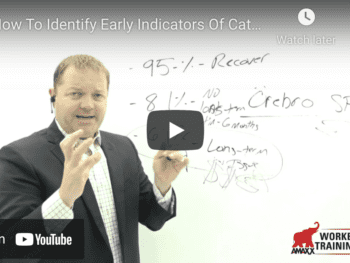
When a person who is not familiar with the vocabulary of workers’ compensation reads a claims report or the adjuster file notes, it can be similar to trying to read a foreign language. There are many words and phrases in worker’s compensation that are subject to repetitive use throughout the day or throughout a claim file. Rather than constantly typing out the words or phrases, abbreviations are used.
The most popular workers compensation abbreviations include:
AWW: Average weekly wage – the average earnings of an employee based on a set number of weeks (or months) prior to the injury
C: Claimant – the injured employee
Click Link to Access Free PDF Download
Clmt: Claimant
CMS: Centers for Medicare and Medicaid Services – the federal government agency that oversees the Medicare and Medicaid programs
CMS: Claim management system – within context, the computer system used with the claim handling
DA: Defense attorney – the attorney representing the employer
DB: Death benefits paid to a deceased employee’s dependents
DME: Durable medical equipment – medical equipment that can be used multiple times, like canes and wheelchairs
DOB: Date of birth
DOH: Date of hire
EE: Employee
EFR: Employer’s First Report (same as FROI) – This is the state-mandated claim report form which gives the details of the claim – the employee’s identifying information, the employer’s identifying information, the details of the injury, and the information on the initial medical provider.
ER: Employer
FCE: Functional Capacity Evaluation – a type of testing that measures an employee’s ability to perform various physical functions including lifting, twisting, bending, range of motion, etc.
FCM: Field Case Manager. A nurse case manager who works outside of the office by meeting with the injured employee and by attending medical appointments with the injured employee.
FD: Full duty
FROI: First Report of Injury (same as EFR). This is the state-mandated claim report form which gives the details of the claim – the employee’s identifying information, the employer’s identifying information, the details of the injury, and the information on the initial medical provider.
FT: Full-time employee
IC: Industrial commission – in some states, the name of the state agency overseeing workers’ compensation
IME: Independent medical examination or independent medical evaluation – A medical examination/evaluation by a medical specialist who has not been involved in the medical care of the injured employee to verify the validity of proposed medical care, or the level of disability impairment of the injured employee
IND: Indemnity – the compensation paid to an injured employee while they are off work, or compensation paid to the employee for a permanent injury
Insd: Insured – the employer
IR: Impairment rating – a measurement of the level of impairment an injured employee has incurred, often stated in percentage terms
IW: Injured worker – the employee who got hurt
LD: Light duty
Mods: Modifications and restrictions placed on the injured employee returning to work, normally stating as restrictions on lifting, bending, twisting, carrying, stooping, etc.
Leakage: Any payment on a workers’ compensation claim that should not have been made
LT: Lost time – the injured employee is out of work longer than the state-mandated waiting period
FREE DOWNLOAD: “Step-By-Step Process To Master Workers’ Comp In 90 Days”
MCO: Managed care organization – a group of doctors, hospitals and other medical providers who work together to provide medical care for an injured employee at a pre-agreed reduced price
MMI: Maximum medical improvement – the point where the medical provider advises the injured employee that they will not recover any further from their injury
MMR: Maximum medical recovery – same as MMI
MO: Medical only – the injured employee will receive medical benefits but is not eligible for any type of indemnity compensation.
MP: Medical provider
MSA: Medicare Set-aside Arrangement – aka Medicare Set-aside Agreement, an agreement with CMS on the future cost of medical services an injured employee will need, and the setting aside of the agreed dollar amount in a trust for the future payment of medical expenses
MSP: Medicare Secondary Payor – a federal law that requires all future medical benefits owed under workers’ compensation to be paid by the work comp insurer and not shifted to Medicare or Medicaid
OC: Opposing counsel – the attorney representing the injured employee
OH: Occupational health – A medical specialty focusing on the health, safety and welfare of employees
Ortho: An orthopedic doctor
OT: Occupational therapy
OW: Off work – the injured employee is physically unable to return to work either light duty or full duty
NCM: Nurse case manager
PI: Permanent impairment – the level of disability the injured employee has once the doctor has placed the employee at MMI
PP: Preferred provider – a medical provider within an MCO or PPO that has demonstrated superior medical service and medical results while returning the injured employee to work in the shortest period of time
PPO: Preferred provider organization – similar to MCO, a group of doctors, hospitals and other medical providers who work together to provide medical care for an injured employee at a pre-agreed reduced price
PPD: Permanent partial disability – the degree of impairment the injured employee has after reaching maximum medical improvement
PRS: Physician review service – a group of board certified physicians who provide utilization review services and peer to peer reviews
PT: Part-time employee (look for the context in which PT is used)
PT: Physical therapy
PTD: Permanent total disability – the injured employee injury is such that the employee is permanently unable to return to any type of work
Reserves: The amount of money set aside to pay the future cost of a work comp claim
RTW: Return to work
SNR: Senior nurse reviewer – a highly experienced nurse case manager involved in the most complex medical cases
Subro: Subrogation – the process where the insurer recovers the cost of the claim from a responsible third party, for example – when the employee is injured in a not at fault automobile accident
SSDI: Social security disability income – the payment an injured employee receives from the federal government when the employee is totally and permanently disabled
SSN: Social security number of the injured employee
TCM: Telephonic case manager – A nurse case manager who works exclusively from an office and handles the majority of communications via the telephone
TPA: Third-party administrator – an independent hired by a self-insured employer or by an insurer to handle workers’ compensation claims
TPD: Temporary partial disability – the employee is able to perform some type of work but is physically unable to return to the prior job duties
Triage: A nurse who arranges and coordinates the medical care for an injured employee, and keeps both the employer and the adjuster up to date on the medical treatment status
TTD: Temporary total disability – the disability compensation paid to an injured employee who is unable to perform any type of work
UR: Utilization review – a medical management service where the medical treatment requested is reviewed for necessity
WC: Workers’ compensation
WC: Work capacity – when used within the context of the employee’s ability to RTW, often stated as full duty work capacity, light duty work capacity, light duty with restrictions or unable to work in any capacity
WCB: Workers’ compensation board – in some states, the name of the state agency overseeing workers’ compensation
WCC: Workers’ compensation commission – in some states, the name of the state agency overseeing workers’ compensation
While this is a comprehensive list, it by no means includes all the claim acronyms that are used. Some claims offices will utilize acronyms that are specific to their state work comp statutes or limited to a particular medical specialty.

©2020 Amaxx Risk Solutions, Inc. All rights reserved under International Copyright Law.
FREE DOWNLOAD: “Step-By-Step Process To Master Workers’ Comp In 90 Days”














 Using Prescription Drug Formularies to Manage Work Comp Costs
Using Prescription Drug Formularies to Manage Work Comp Costs
